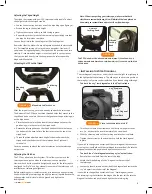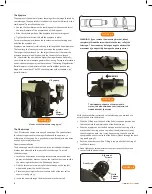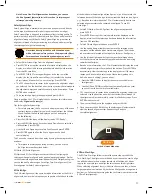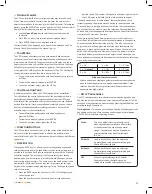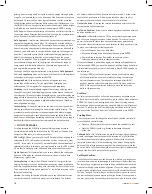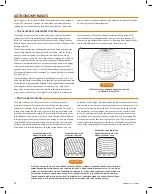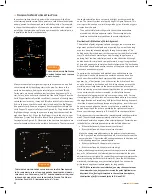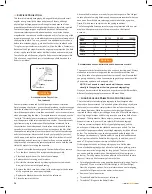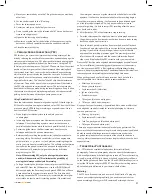
>>
www
.celestron
.com
13
>>
Finding Planets
The CPC can locate all 8 of our solar systems planets plus the Sun and
Moon . However, the hand control will only display the solar system
objects that are above the horizon (or within its filter limits). To locate the
planets, press the PLANET key on the hand control . The hand control will
display all solar system objects that are above the horizon:
• Use the Up and Down keys to select the planet that you wish
to observe .
• Press INFO to access information on the displayed planet.
• Press ENTER to slew to the displayed planet.
To allow the Sun to be displayed as an option in the database, see Sun
Menu in the Utilities section of the manual (pg . 15) .
>>
Tour Mode
The CPC includes a tour feature which automatically allows the user
to choose from a list of interesting objects based on the date and time
in which you are observing . The automatic tour will display only those
objects that are within your set filter limits (see Filter Limits in the Scope
Setup Features section of the manual on page 15). To activate the Tour
mode, press the TOUR key (6) on the hand control. The CPC will display
the best objects to observe that are currently in the sky.
• To see information and data about the displayed object, press the
INFO key.
• To slew to the object displayed, press ENTER.
• To see the next tour object, press the UP key.
>>
Constellation Tour
In addition to the Tour Mode, the CPC telescope has a Constellation
Tour that allows the user to take a tour of all the best objects within a
particular constellation. Selecting Constellation from the LIST menu
will display all the constellation names that are above the user defined
horizon (filter limits). Once a constellation is selected, you can choose
from any of the database object catalogs to produce a list of all the
available objects in that constellation.
• To see information and data about the displayed object,
press the INFO key.
• To slew to the object displayed, press ENTER.
• To see the next tour object, press the UP key.
>>
Direction Buttons
The CPC has four direction buttons (3) in the center of the hand control
which control the telescope’s motion in altitude (up and down) and
azimuth (left and right). The telescope can be controlled at nine different
speed rates .
>>
Rate Button
Pressing the RATE key (11) allows you to instantly change the speed
rate of the motors from high speed slew rate to precise guiding rate or
anywhere in between . Each rate corresponds to a number on the hand
controller key pad . The number 9 is the fastest rate (3º per second,
depending on power source) and is used for slewing between objects
and locating alignment stars . The number 1 on the hand control is the
slowest rate ( .5x sidereal) and can be used for accurate centering of
objects in the eyepiece and photographic guiding. To change the speed
rate of the motors:
• Press the RATE key on the hand control. The LCD will display the
current speed rate .
• Press the number on the hand control that corresponds to the
desired speed . The number will appear in the upper-right corner of
the LCD display to indicate that the rate has been changed .
The hand control has a “double button” feature that allows you to
instantly speed up the motors without having to choose a speed rate .
To use this feature, simply press the arrow button that corresponds to
the direction that you want to move the telescope . While holding that
button down, press the opposite directional button . This will increase the
slew rate to the maximum slew rate .
When pressing the Up and Down arrow buttons in the slower slew
rates (6 and lower) the motors will move the telescope in the opposite
direction than the faster slew rates (7 thru 9). This is done so that an
object will move in the appropriate direction when looking into the
eyepiece (i .e . pressing the Up arrow button will move the star up in the
field of view of the eyepiece). However, if any of the slower slew rates
(rate 6 and below) are used to center an object in the finderscope, you
may need to press the opposite directional button to make the telescope
move in the correct direction .
Nine available slew speeds
1 = .5x*
4 = 8x
7 = .5º / sec
2 = 1x (sidereal)*
5 = 16x
8 = 2º / sec
3 = 4x
6 = 64x
9 = 4º / sec
*Rate 1 and 2 are photographic guide rates and are meant to be used
when the telescope is set up on a wedge in equatorial mode. These
rates can be used while set up in altazimuth, however the actual
speed rate may differ slightly.
>>
Setup Procedures
The CPC contains many user defined setup functions designed to give
the user control over the telescope’s many advanced features . All of the
setup and utility features can be accessed by pressing the MENU key and
scrolling through the options:
Tracking Mode – This allows you to change the way the telescope tracks
depending on the type of mount being used to support the telescope .
The CPC has three different tracking modes:
Alt-Az
This is the default tracking rate and is used
when the telescope is placed on a flat surface
or tripod without the use of an equatorial
wedge . The telescope must be aligned with
two stars before it can track in altazimuth
(Alt-Az) .
EQ North
Used to track the sky when the telescope
is polar aligned using an equatorial wedge in
the Northern Hemisphere .
EQ South
Used to track the sky when the telescope
is polar aligned using an equatorial wedge in
the Southern Hemisphere .
OFF
When using the telescope for terrestrial
(land) observation, the tracking can be
turned off so that the telescope never moves.
Summary of Contents for 11007
Page 1: ...InstructionManual 11007 11008 11009...
Page 2: ...www celestron com...
Page 40: ...38 www celestron com APPENDIXD MAPSOFTIMEZONES...
Page 41: ...www celestron com 39...
Page 42: ...40 www celestron com APPENDIXE SKYMAPS...
Page 43: ...www celestron com 41...
Page 44: ...42 www celestron com...
Page 45: ...www celestron com 43...
Page 46: ...44 www celestron com...
Page 47: ...www celestron com 45...







